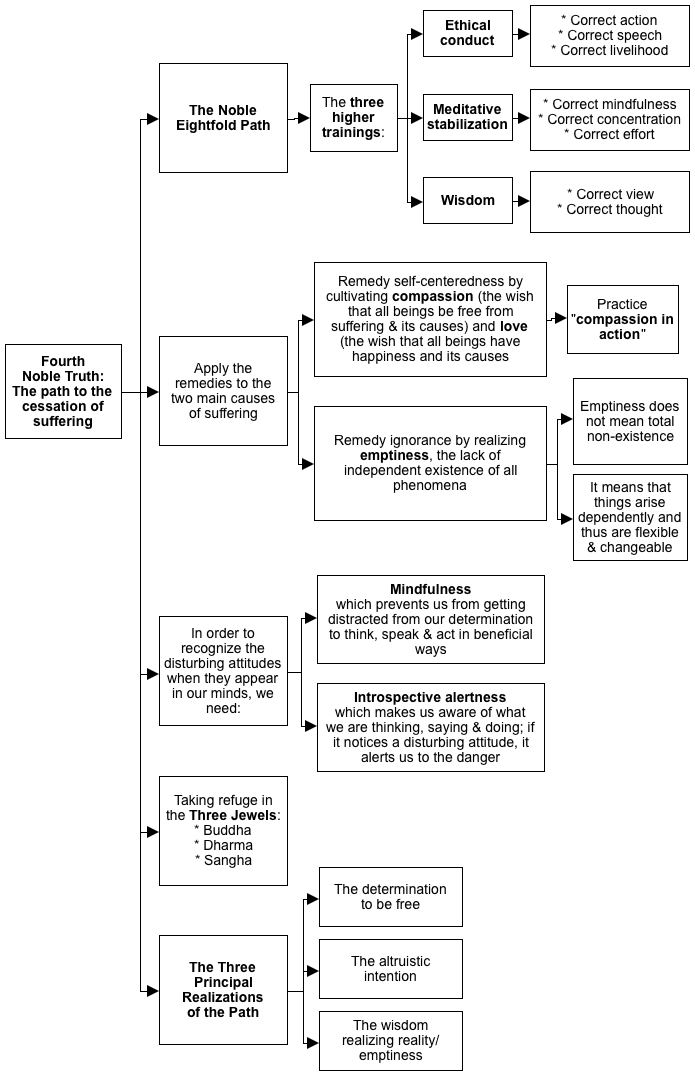Notes
What Is the Determination to Be Free?
The determination to be free (renunciation) is an attitude.
- It's one of the three principal aspects of the path.
- What we want to renounce is suffering & confusion. We're not renouncing pleasure; we're renouncing the unsatisfactoriness in life.
- We may give up the low-grade happiness in order to escape the box we're in and emerge into a truly happy state.
- The ultimate happiness is completely purifying our minds and developing our good qualities, becoming a fully enlightened Buddha who can benefit all beings.
- We're giving up the attachment to the objects; it's the attachment that brings the suffering. To be free of that is blissful, tranquil, & deeply satisfying.
- We renounce not only the suffering, but the causes of suffering.
- This includes ignorance, attachment, clinging, craving, anger, etc.
- Keeping good ethical conduct helps us renounce the causes of misery.
The determination to be free has two levels, i.e., we want to be:
- Free from unfortunate rebirths & the negative actions that cause these rebirths
- Living ethically is the cause for a good rebirth.
- A good rebirth cannot provide perfect & unending happiness; as long as we're under the influence of ignorance and disturbing actions & attitudes, we aren't free.
- Eventually we realize that there's nothing in any realm of existence worth being attached to; all pleasures in cyclic existence are temporary.
- Free from all uncontrolled rebirth in cyclic existence, i.e., attain liberation (nirvana)
- Eradicate disturbing attitudes & actions by developing the three higher trainings:
- Ethical conduct: We avoid destructive actions.
- Essentially, it's the wish not to do harm.
- We do it for both ourselves & others, as it reduces suffering on both sides.
- Concentration: We subdue the gross disturbing attitudes and gain the ability to direct our minds to whatever object of meditation we wish for as long as we wish.
- Wisdom: With wisdom combined with concentration, we penetrate the meaning of reality and thus eliminate our ignorance, disturbing attitudes & the karmic imprints that produce suffering.
- Ethical conduct: We avoid destructive actions.
- Eradicate disturbing attitudes & actions by developing the three higher trainings:
What Is the Relationship Between Attachment and the Determination to Be Free?
Attachment is the chief impediment to developing the determination to be free.
- We're attached to what we consider pleasant and have aversion to what's unpleasant, giving us a very limited outlook.
- These attachments & aversions lead us to act negatively & selfishly, which create problems in this life as well as karmic imprints that affect future lives.
- The Buddha stressed that sensual pleasures are not bad in themselves, but:
- We should examine our experiences to see if they really bring happiness.
- The problem lies not in the objects themselves, but in our attachment to them.
Happiness Now and in the Future
When we understand the problems attachment brings:
- We'll still want to be happy now, but we won't be obsessed with getting everything we think we need or want.
- We'll also recognize the importance of preparing for future lives.
The principal method to prepare for future lives and eliminate turmoil in the present life is to observe cause and effect—karma—by abandoning destructive actions & practicing constructive ones.
- We can follow cause & effect by training ourselves to subdue gross attachment, anger, jealousy, ignorance, deluded doubt, & pride.
- Meditation on impermanence is a good technique/antidote for beginners (e.g., everything changes moment to moment, don't exaggerate the importance of what happens to us, etc.).
- The ultimate antidote is wisdom realizing emptiness.
- Each disturbing emotion also has a particular antidote.
The less we're attached to the finite pleasures of this life, the more happy, peaceful, relaxed & non-anxious we'll be. This allows us to relate to our environment & other people in a more caring way.

